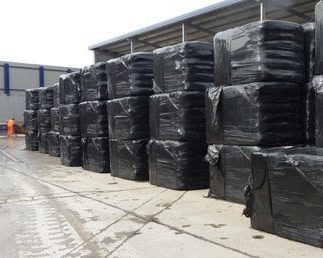The Netherlands’ House of Representatives will vote this week on its government’s tax plans for 2020, which include a €31 per tonne tax on the import of refuse derived fuel (RDF).
The tax could have a big impact on the UK which exports about 14% of its residual waste overseas in the form of RDF for energy recovery, with about half going to the Netherlands.
A debate on the ‘2020 Tax Plan’ – the legislation which outlines changes to tax legislation – will begin today and last two days before the vote is made on Thursday. The proposals will then go before the country’s Senate next month for final discussion and consideration.
If the Senate was to back the proposals with no amendments, they could come into force from 1 January 2020, a Dutch House of Representatives spokesperson confirmed to letsrecycle.com.
A spokesperson for the finance ministry confirmed that a letter speaking in favour of the plans from the minister for the environment and housing, Stientje van Veldhoven, will be sent to the parliament for the debate today.
The government will officially respond to today’s debate tomorrow (November 13), with the vote taking place the following day.
Consequently, the industry is warning that the tax might not have the CO2 benefits that the Dutch government is aspiring to. And, one industry expert told letsrecycle.com that some Members of the Netherlands Parliament have now asked the Ministry to discuss an alternative plan for CO2-reduction with the Dutch Waste Management Association.
Proposals
In September, the Netherlands government laid out its proposals for an RDF tax as part of a package of measures to address climate change.
It is likely to increase the cost of residual waste treatment for local authorities and businesses from the UK who use incineration plants in the Netherlands to dispose of waste (see letsrecycle.com story) although whether the full 31 Euros would be passed on as an extra gate fee cost is unclear.
Documents published on the government’s tax proposals indicate that around 1.9 million tonnes of ‘foreign’ waste is incinerated in Holland’s energy from waste facilities, roughly 25% of the country’s overall capacity, including a large proportion from the UK.
Opposition
In recent weeks, as the proposals made their way through parliament, they have received vehement criticism from many in the sector and also MPs.

The ban is likely to increase the cost of residual waste treatment for UK local authorities and businesses
The proposals were debated in their first ‘legislative consultation’ in parliament on the 28th October.
Dutch MPs raised concerns that the proposals will actually be bad for the global environment as the waste could be landfilled elsewhere.
The green party, GroenLinks, said it is not yet convinced on this measure, because the governmental Planning Bureau for Environment had published a report in which it was stated that the CO2-impact of the import tax was still unpredictable and unknown.
The Elderly Party 50+ commented that it was undesirable to implement a measure that led to more CO2-emissions.
Other opposition to the proposals included the Christian-democrat party CDA (part of the government’s coalition). It warned that due an import tax Dutch waste-to-energy plants could go bankrupt which could mean a significant burden on municipalities that own different waste-to-energy plants in the Netherlands.
However, despite the lobbying against the measure, the government has reiterated previously that it needs to reduce its own carbon emissions, particularly in light of the Urgenda court case which compelled it to reduce its own emissions by 25% by 2020, compared with 2010 levels.
Alternative markets
Speaking at the Fire Prevention conference last week in Solihull, Bethany Ledingham from the RDF Industry Group secretariat, suggested that instead of sending RDF to Holland, some exports could be switched instead to Scandinavian countries if the tax is introduced.
Ms Ledingham said: “The Netherlands takes about half the tonnage from the UK – we are not very sure how the market will react next but we would anticipate that firms will try and move their contracts away from the Netherlands towards other nations, perhaps Scandinavian countries.”
“The Netherlands takes about half the tonnage from the UK – we are not very sure how the market will react “
She went on to explain that shipping changes as a result of switching destinations could potentially lead to greater fire risk in the UK.
“It moves to Holland very quickly as it moves via ferries which cross the Channel. Scandinavian countries, their supply chain is for RDF to travel back on ships in bulk shipments and those ships take about 2,000-3,000 tonnes of waste at a time.
“Therefore, the supply chain might be producing RDF for a couple of weeks or potentially a couple of months in order to stockpile enough RDF for these shipments. So, one potential impact of tax in the Netherlands could be to increase storage times as the industry switches away to other nations meaning a changing risk profile.”
The post Dutch ‘RDF tax’ faces critical vote appeared first on letsrecycle.com.
Source: letsrecycle.com Waste Managment



